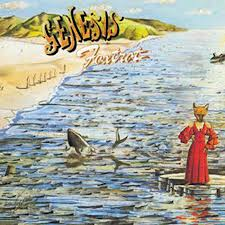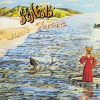 Genesis, especially the classic line up of Tony Banks, Peter Gabriel, Phil Collins, Mike Rutherford and Steve Hackett would become one of the U.K.’s favourite Progressive Rock bands on the strength of the 1972 album Foxtrot.
Genesis, especially the classic line up of Tony Banks, Peter Gabriel, Phil Collins, Mike Rutherford and Steve Hackett would become one of the U.K.’s favourite Progressive Rock bands on the strength of the 1972 album Foxtrot.
This eccentric band packed to the rafters with burgeoning talent had already broken parts of Europe with Trespass and the charming Nursery Cryme but as had up to that point failed to break the U.K top 20 album chart. Their first album From Genesis to Revelation had failed to convince the British public that their music was worth listening to, Trespass saw them make inroads and Nursery Cryme make friends, it was however the pastoral feel combined with an abundance of British eccentricity that would convince music listeners that these five performers had something worthwhile to say.
What makes this album special and a cut above the previous three albums was two particular musical compositions, two moments in time that stopped the album from being on par with Nursery Cryme and the success of these two master works of their career gave them the impetus to develop their ideas fully, to take the story approach and bring the art of narrative into full view whilst retaining loyalty to the incredible music they were creating. Listeners would have to go through four very good songs on side one, turn the record over and then as if by magic, the band would be transformed in the blink of an eye. From composing good progressive rock they would grow in stature on the basis of the ethereal beauty of Steve Hackett’s guitar on the track Horizons, at 101 seconds long one of the shortest pieces the band recorded but also one of the most longed for on Steve Hackett’s solo shows and the dramatic, opera-like scale and crashing insanity of Supper’s Ready.
The band borrowed the opening album track title from a poem by John Keats and by doing so introduced the audience to a world where Wagner met Prog, one and half minutes of opening mellotron heaven that would seep into the gut of the listener and fester as only two chords can as one of the most easily identified openings to an album from that period. Watcher of the Skies is grandiose, the large scale and importance that all albums should have. It just doesn’t announce itself it rings the doorbell repeatedly, it uses a black rod to knock at the door several times before you relent and accept this piece of music into your heart. It is the perfect opening and gives the right tone of the oncoming storm that sits on the album’s second side.
Although the album announces itself superbly, it doesn’t quite have the overall charm of the band’s previous album, the pastoral and unique quality of the English story is in evidence but there is something missing that gave the previous album substance. The remaining three songs of Foxtrot’s first side sit comfortably within the framework of the recoding but aside from Can-Utility and the Coastliners can appear a bit weak when the album is looked on as a whole. This might be unfair because the epic will always take something away from the songs that surround it. However it is worth noting that a song that had been hanging around for the band, the exceptional Twilight Alehouse (which finally surface on the B side of I Know What I Like (In Your Wardrobe) in 1973), would have made an exceptional substitution and added to the disturbing nature of Supper’s Ready.
Once the listener turned over the record, the scene was transformed, gone was the historical story of King Canute and the fawning nature of his people who told him he was so great he could hold back the tide, the frightening prospect of human nature being controlled and the insidious nature of business in Get ‘Em Out By Friday and in their place came Steve Hackett’s guitar and 101 seconds of bliss. The child-like innocence of Horizons gives a glimmer of hope on an album that is discernible for the bleak subject matter that parades throughout. It is a refrain that Steve Hackett has made great use of over the years and it works like a beautiful and untarnished charm. The music is part sensual, part English summer, images of cricket and tea on the lawn, the England of William Blake and the age of incorruptibility before the country lost its way. It may be considered one of the great moments of early Genesis and what makes it stand out even further is that acts as one of the great preludes, the opening act before the operatic and substantial Supper’s Ready.
Standing at a gargantuan 22 minutes and 51 seconds long, Supper’s Ready is a track that has so much written about it, that in the same vein as 1974 The Lamb Lies Down On Broadway album, it is near almost impossible to add anything new to the many theories and dissection of the lyrics. Divided into seven sections the track has the benefit of being a story like no other, one of good versus evil, of love, religious symbolism and changing mood and time signatures,
The opening section can be seen as carrying on the light hearted but powerful prelude of Horizons and as Peter Gabriel’s voice sets the scene with the line, “Walking across the sitting room, I turn the television off…” the song becomes something more than just another track about myth and magic, of a history re-written. The music which slowly over the next 23 minutes transports the listener to another realm, a place just like our own but with the rules of humanity subverted and taken apart. The nonsense like lyrics, which remind the listener of Edward Lear, are fused with some of the most intense sounds produced by the band during this period and wrapped up in a tight warning of images to come and the absurdity of witnessing Winston Churchill dressed in drag.
It has to be said that Genesis was certainly one of the finest examples of being able to turn the classics of English literature into great Progressive Rocks songs. Whether through the imagery of Tiresias from Dante’s Inferno and classic Greek writing in the song The Cinema Show or the startling metamorphosis of Narcissus into a flower, the use of the narrative was never far from the early songs of Genesis and would not really be seen again till Marillion wrote the anti-story of Beowulf in their classic track of Grendel.
Although Foxtrot cannot be seen as the finest album to come out of the classic Genesis portfolio of albums that ranged between 1971 and 1976, it can be seen as the moment that once Steve Hackett’s delightful solo acoustic piece of Horizons played out that they came fully of age and a major force in the world of Progressive Rock. Foxtrot to this day remains an enigma which houses the puzzle and uncertainty of Supper’s Ready and which remains not just a piece of work but an art form in itself.
Ian D. Hall
